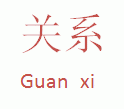When researching the intricacies of conducting business in China no one will miss the word "guanxi". The concept of guanxi is enormously rich, complex, and dynamic and the growing acceptance and popularity of guanxi in the West has made it all the more important to understand the construct in its entirety (Chen, 2004 and Redding and Wong, 1986). In fact, respect for guanxi is one of the first things that a foreigner learns about "how to do business in China" (Lee, 2006). Furthermore, guanxi is believed to be so important in Chinese society, it has been suggested that most Chinese individuals and organisations rely upon it to a certain degree (Shan, 2005). Despite this, controversy surrounds the ethical status of guanxi. Many simply regard guanxi as a Chinese word for corruption, but nonetheless accept it as "as an unfortunate, though necessary evil for those wishing to succeed in business in China" (Dunfee and Warren, 2001: 195).
In this essay I will therefore analyse exactly what guanxi is, and argue that while certain aspects of guanxi are indeed corrupt, it is far too simply to label the entirety of this complex social construct as corruption. Rather, each individual guanxi transaction needs to be analysed in order to determine if it constitutes corruption or a way of doing business.
However, before analysing the importance of guanxi, it is vital to firstly understand exactly what guanxi is. This is not an easy task, as Tsui and Farh (1997: 59) remark "the literature (both Chinese and English) shows no consensus in translation of the term guanxi". Although guanxi is able to be interpreted at different levels and from different perspectives (Tsui and Farh, 1997 and Yang, 1994), it is commonly referred to as an indigenous Chinese construct (Hwang, 1987; Yeung & Tung,


